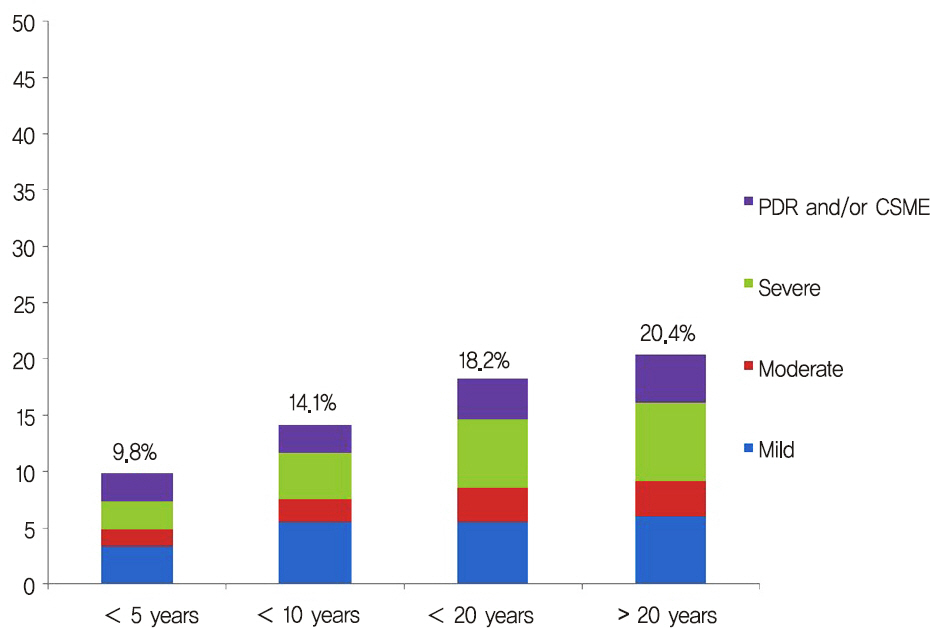J Korean Ophthalmol Soc.
2011 Nov;52(11):1296-1301.
Study on Survey of Knowledge and Awareness Level of Diabetic Retinopathy in Type 2 Diabetes Patients: Results from Seoul Metro-City Diabetes Prevention Program Survey
- Affiliations
-
- 1Department of Ophthalmology, Kangbuk Samsung Hospital, Sungkyunkwan University School of Medicine, Seoul, Korea. eye-su@hanmail.net
- 2Department of Endocrinology, Kangbuk Samsung Hospital, Sungkyunkwan University School of Medicine, Seoul, Korea.
Abstract
- PURPOSE
To investigate the knowledge and awareness level of diabetic retinopathy (DR) in type 2 diabetes patients.
METHODS
A total of 437 participants with diabetes were recruited in the Seoul Metro-City Diabetes Prevention Program (SMC-DPP). Participants underwent clinical and laboratory examinations and questionnaire survey to evaluate diabetes complications. The DR was diagnosed by grading fundus photographs 5 standard fields taken per eye.
RESULTS
The overall prevalence of any DR was 20.4% and only 6.6% of patients were aware of their DR. The DR patients who underwent an eye examination within the previous year were 42.3%, and 50.3% out of 437 patients enrolled were educated on diabetes. Of the survey participants, 83.8% answered positive to 'Evaluation of diabetes mellitus complication must be performed every year', 61.1% answered positive to 'Must control blood pressure and lipid level for diabetes management' and 28.4% believed 'It takes a long time for complications of diabetes to develop'. The DR self awareness was 14.6% and an eye examination within the previous year was 50.6% among the 89 DR participants.
CONCLUSIONS
Results of the survey with SMC-DPP type 2 diabetes participants showed a low knowledge and awareness level of chronic complications such as DR.
MeSH Terms
Figure
Reference
-
References
1. Park IB, Baik SH. Epidemiologic Characteristics of Diabetes Mellitus in Korea: Current Status of Diabetic Patients Using Korean Health Insurance Database. Korean Diabetes J. 2009; 33:357–62.
Article2. Thompson TJ, Engelgau MM, Hegazy M, et al. The onset of NIDDM and its relationship to clinical diagnosis in Egyptian adults. Diabet Med. 1996; 13:337–40.
Article3. Choi YJ, Kim HC, Kim HM, et al. Prevalence and Management of Diabetes in Korean Adults: Korea National Health and Nutrition Examination Surveys 1998–2005. Diabetes Care. 2009; 32:2016–20.4. Aamir AH. Targets for treating type 2 Diabetes and preventing its complications: can we achieve it? Pak J Med Res. 2004; 43:95–6.5. Turner RC. The U.K Prospective Diabetes Study. Diabetes Care. 1998; 21:35–8.6. The effect of intensive treatment of diabetes on the development and progression of long-term complications in insulin-dependent diabetes mellitus. The Diabetes Control and Complications Trial (DCCT) Research Group. N Engl J Med. 1993; 329:977–86.7. Kim EJ. Aims of diabetes treatment and importance of diabetes education. Diabetes Metab J. 1985; 9:1–3.8. Gill GS, Jeong IS. Knowledge, perceived seriousness and adherence to preventive behaviors on chronic complications of diabetes mellitus. Korean J Health Promot Dis Prev. 2005; 2:78–89.9. Grading diabetic retinopathy from stereoscopic color fundus photographs an extension of the modified Airlie House classification. ETDRS report number 10. Early Treatment Diabetic Retinopathy Study Research Group. Ophthalmology. 1991; 98:786–806.10. Nam JH, Lee SH, Lee HJ, et al. The prevalence of chronic complications in non-insulin dependent diabetic patients. J Korean Diabetes Assoc. 1999; 23:702–14.11. American Diabetes Association. Standards of medical care for patients with diabetes mellitus. Diabetes Care. 1994; 17:616–23.12. Glasgow RE, Osteen VL. Evaluating diabetes education: Are we measuring the most important outcomes? Diabetes Care. 1992; 15:1423–32.
Article13. Anderson RM, Funnell MM, Butler PM, et al. Patient empowerment. Results of a randomized controlled trial. Diabetes Care. 1995; 18:943–49.
Article14. D'Eramo-Melkus GA, Wylie-Rosett J, Hagan JA. Metabolic impact of education in NIDDM. Diabetes Care. 1992; 15:864–9.15. Kim JH, Chang SA. Effect of diabetes education program on glyce-mic control and self management for patients with type 2 diabetes mellitus. Korean Diabetes J. 2009; 33:518–25.
Article16. Goudswaard AN, Stolk RP, Zuithoff NP, et al. Long-term effects of self-management education for patients with type 2 diabetes taking maximal oral hypoglycaemic therapy: a randomized trial in primary care. Diabet Med. 2004; 21:491–6.
Article17. Norris SL, Lau J, Smith SJ, et al. Self-management education for adults with type 2 diabetes: a meta-analysis of the effect on glyce-mic control. Diabetes Care. 2002; 25:1159–71.
- Full Text Links
- Actions
-
Cited
- CITED
-
- Close
- Share
- Similar articles
-
- Factors Influencing the Level of Diabetic Retinopathy in Patients with Type 2 Diabetes Mellitus
- Clinical Analysis of Diabetic Retinopathy According to the Type of Diabetes Mellitus
- Letter: Diabetic Retinopathy and Endothelial Dysfunction in Patients with Type 2 Diabetes Mellitus (Diabetes Metab J 2013;37:262-9)
- Response: Features of Long-Standing Korean Type 2 Diabetes Mellitus Patients with Diabetic Retinopathy: A Study Based on Standardized Clinical Data (Diabetes Metab J 2017;41:393-404)
- Letter: Clinical Course and Risk Factors of Diabetic Retinopathy in Patients with Type 2 Diabetes Mellitus in Korea (Diabetes Metab J 2016;40:482-93)


